Politics
 When I first heard about the bizarre phenomenon found under the home of Benjamin Franklin, I thought of a few possibilities. The remains, found in 1998, consisted of 1,200 bones are believed to be from more than 15 human bodies found in the basement of Ben Franklin’s house. Six of the bodies were children. My first thought was, “Please tell me that this is some Indian burial site, or that there is some logical explanation as to why there would be bodies buried in this hero Founding Father’s home.” I have always liked Ben Franklin. I found his “antics” to be so interesting. To say the least, he was a bit strange in his experimentations, and that was enough to make me wonder (and hope it wasn’t so) if Ben Franklin could possibly have some horrid alter ego. He wouldn’t be the first scientist to go off the deep end to experiment on human bodies, but then again, there certainly are people today that have chosen to donate their bodies to science, so why couldn’t that be the case back then. I prayed that was the case.
When I first heard about the bizarre phenomenon found under the home of Benjamin Franklin, I thought of a few possibilities. The remains, found in 1998, consisted of 1,200 bones are believed to be from more than 15 human bodies found in the basement of Ben Franklin’s house. Six of the bodies were children. My first thought was, “Please tell me that this is some Indian burial site, or that there is some logical explanation as to why there would be bodies buried in this hero Founding Father’s home.” I have always liked Ben Franklin. I found his “antics” to be so interesting. To say the least, he was a bit strange in his experimentations, and that was enough to make me wonder (and hope it wasn’t so) if Ben Franklin could possibly have some horrid alter ego. He wouldn’t be the first scientist to go off the deep end to experiment on human bodies, but then again, there certainly are people today that have chosen to donate their bodies to science, so why couldn’t that be the case back then. I prayed that was the case.
At this point, many people would immediately assume that Ben Franklin was some kind of closet killer, who tortured and murdered his victims. It would be thought that the world had been so naive, that we lived in the dark for years, but before you go crafting a murder mystery about him, please be aware that it was revealed that the bodies were used in the study of human anatomy. So, it actually was bodies donated for scientific 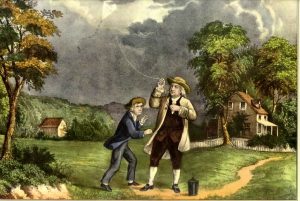 research. I certainly didn’t know that they did that sort of thing back then, but it seems that they did.
research. I certainly didn’t know that they did that sort of thing back then, but it seems that they did.
The house, located in London, England was undergoing some conservation work in 1998, when the bones were discovered. Some of the bodies were dismembered, or had trepanned skulls, which is skulls with holes drilled through them. Ben Franklin had lived home in London for nearly twenty years leading up to the signing of the Declaration of Independence. It was more than 200 years later, when the conservation work uncovered the 15 bodies in the basement, buried in a secret, windowless room beneath the garden. While on could imagine horrible things, “The most plausible explanation is not mass murder, but an anatomy school run by Benjamin Franklin’s young friend and protege, William Hewson.” So, it would seem that Ben Franklin either loaned the home to Hewson (a surgeon), stored the bodies for Hewson, or allowed Hewson to do his scientific experiments in the room in the Franklin house. Whatever the case may be, it is apparently well enough documented that the authorities were satisfied that Ben Franklin wasn’t personally involved.
One such speculation was that “Anatomy was still in its infancy, but the day’s social and ethical mores frowned upon it. … A steady supply of human bodies was hard to come by legally, so Hewson, Hunter, and the field’s other pioneers had to turn to grave robbing—either paying professional ‘resurrection men’ to procure cadavers 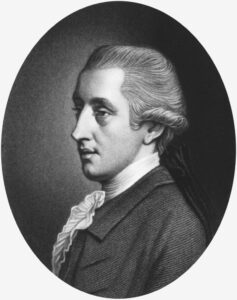 or digging them up themselves—to get their hands on specimens. Researchers think that 36 Craven was an irresistible spot for Hewson to establish his own anatomy lab. The tenant was a trusted friend, the landlady was his mother-in-law, and he was flanked by convenient sources for corpses. Bodies could be smuggled from graveyards and delivered to the wharf at one end of the street or snatched from the gallows at the other end. When he was done with them, Hewson simply buried whatever was left of the bodies in the basement, rather than sneak them out for disposal elsewhere and risk getting caught and prosecuted for dissection and grave robbing.” Some people speculate that Ben Franklin knew about the goings on, but was not personally involved, still, they thought he might have gone to the lab a few times to check out the proceedings. I hate to think that he knew anything about it, and I would prefer to think that the study of anatomy was done in his absence, but I suppose that our modern-day anatomy studies and autopsies were probably pioneered in a basement somewhere.
or digging them up themselves—to get their hands on specimens. Researchers think that 36 Craven was an irresistible spot for Hewson to establish his own anatomy lab. The tenant was a trusted friend, the landlady was his mother-in-law, and he was flanked by convenient sources for corpses. Bodies could be smuggled from graveyards and delivered to the wharf at one end of the street or snatched from the gallows at the other end. When he was done with them, Hewson simply buried whatever was left of the bodies in the basement, rather than sneak them out for disposal elsewhere and risk getting caught and prosecuted for dissection and grave robbing.” Some people speculate that Ben Franklin knew about the goings on, but was not personally involved, still, they thought he might have gone to the lab a few times to check out the proceedings. I hate to think that he knew anything about it, and I would prefer to think that the study of anatomy was done in his absence, but I suppose that our modern-day anatomy studies and autopsies were probably pioneered in a basement somewhere.
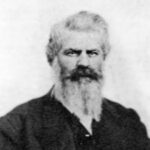 Politics can be a touchy subject. Many arguments have come from political disagreements, and in fact, a number of actual fights and even wars have been fought over political disagreements. The Civil War was one sch war fought over political views. During that time there were also a number of private disputes as well. Sumner Pinkham was in volved on one of those disputes. Sumner Pinkham was born in 1820 in the state of Maine and was raised in Wisconsin. Very little, if anything, is known about his early life. He married Laurinda Maria Atwood in Nebraska on November 4, 1842. In 1849, Pinkham joined the California gold rush and then spent time in Oregon before making his way to the booming gold rush camp of Idaho City in 1862. Pinkham was a big man…powerfully built, who stood six feet two inches tall and had a barrel chest. He was also prematurely gray, making him look older than he really was.
Politics can be a touchy subject. Many arguments have come from political disagreements, and in fact, a number of actual fights and even wars have been fought over political disagreements. The Civil War was one sch war fought over political views. During that time there were also a number of private disputes as well. Sumner Pinkham was in volved on one of those disputes. Sumner Pinkham was born in 1820 in the state of Maine and was raised in Wisconsin. Very little, if anything, is known about his early life. He married Laurinda Maria Atwood in Nebraska on November 4, 1842. In 1849, Pinkham joined the California gold rush and then spent time in Oregon before making his way to the booming gold rush camp of Idaho City in 1862. Pinkham was a big man…powerfully built, who stood six feet two inches tall and had a barrel chest. He was also prematurely gray, making him look older than he really was.
Pinkham was a conservative Republican, a Unionist, and an abolitionist, which put him on the opposite side of the majority of Boise Basin mining camps political views, which were predominantly Democrat. When Pinkham arrived in the Idaho City area, Idaho was still a part of Washington Territory, and the Boise Basin was located in Idaho County, of which Florence was the county seat. Florence was located a way away from the new mining basin, so the Washington Legislature established Boise County on January 29, 1863.
After being in the area for a while, and becoming known for his political views, the Governor of Washington was assigning commissioners and officers to the newly established county, and Pinkham was one of them, assigned to serve as the County Sheriff. On March 4, 1863, Congress created Idaho Territory. At that time Boise County exceeded the other counties in both area and in population. Those in office in Boise County at the time, including Pinkham, retained their positions until the territorial government could be officially organized. Pinkham appointed Orlando “Rube” Robbins, who shared his political opinions, as his deputy in August 1863. Robbins would later make himself known as one of Idaho’s greatest lawmen.
By this time, the Civil War was raging back East, and the area miners began to choose sides, around the Union and Confederate causes. This, dueled with whiskey, caused flair-ups between North and South sympathizers, bring with it fist fights, knife fights, and sometimes gun battles as they used force to show their opinions. That kept both Pinkham and his deputy, Rube Robbins, busy breaking up fights and locking up drunken loudmouths as they threatened to fight it out…to the death. The area being predominately Democrat often placed Pinkham at odds with his constituents due to his staunch Unionist views, Republican politics, and tough law enforcement. His list of enemies grew. Nevertheless, both Pinkham’s enemies and his most loyal friends knew that he was a man they shouldn’t mess with when he undertook to enforce the law, which he did with an iron hand.
His greatest enemy was a Southern gunfighter named Ferdinand “Ferd” Patterson. On one occasion, while Patterson was partying with some of his friends in Idaho City, they took unlawful possession of a brewery in Idaho City. Sheriff Pinkham was called by the owner to remove the rowdy group. When Pinkham entered the brewery, he was met with violent resistance. Pinkham and Patterson immediately hated each other. Patterson was Southerner who was crooked by nature, and Pinkham was a Northerner who tended to be self-righteous. In the end, Pinkham was successful, and Patterson was arrested. When Pinkham lost his October 1864 for re-election as Boise County Sheriff, in a bitter contest between the Democratic successionists and Republican candidates. Pinkham was defeated by A O Bowen by a comfortable majority, and Patterson celebrated, as the last of the ballots were being counted. When Patterson encountered his old nemesis, he began rubbing it in. Pinkham, who was in a rage, swung at Patterson, hitting him in the jaw and throwing the gambler off the street and into the gutter. After that, Pinkham walked away. Everyone expected Patterson to retaliate, but he let it go…for then. Pinkham left Idaho City, following the lost election, heading to Illinois to visit his dying mother. When he returned in 1865, everyone figured they would have it out, but it didn’t happen then either.
After the Civil War ended, Pinkham held a huge Fourth of July party. The crowds were mostly festive, with fireworks blazing and booze abundant. The celebration included a brass band, speeches, patriotic songs, a picnic, and a parade with Pinkham leading the way through town. For the victorious Yankees, it was a proud day. But, for the sullen Confederate sympathizers…not so much. To make matters worse, the Yankee’s heckled the “Blue Bellies” throughout the day. Patterson was furious as he watched Pinkham leading the parade through town. Pinkham singing, “Oh, we’ll hang Jeff Davis to a sour apple tree!” was the last straw. Patterson yelled out to the ex-sheriff that if “he didn’t shut his mouth, he’d shut it for him.” Pinkham invited him to try, and he did. A brief fist fight between the two men resulted in the flag falling into the dust of the street. Some witnesses swore they saw Patterson spit on it, and others attested they heard Pinkham swear he would kill Patterson for that, but nothing more came of it at that time. Several weeks later, on Sunday, July 23rd, Pinkham took a hired carriage from Idaho City to the Warm Springs Resort, which was about two miles west of town. Upon his arrival, Pinkham joined a number of his Unionist friends in the saloon, where they were heard singing patriotic and anti-Confederate songs.
Sometime later, Patterson entered the resort while Pinkham was paying his bill. Initially, Patterson ignored Pinkham, but by the time the ex-sheriff exited the resort, Patterson was outside waiting for him. Patterson said the word “draw” and then taunted Pinkham by calling him an “Abolitionist son-of-a-b***h.” Who drew first is in dispute, but in the end, Pinkham was dead. Patterson quickly fled but was immediately followed by several lawmen. Rube Robbins was the first to catch up to him, about 14 miles from Idaho City. Patterson surrendered to Robbins, who turned the killer over to Sheriff Bowen, who was next on the scene. Bowen and his men took over and escorted Patterson back to Idaho City.
A mob wanted to lynch him, and maybe that would have been justice, because in the “sham” trial held in a predominately Democrat area, Patterson was acquitted, and with that, justice for Pinkham would never be served. Ferd Patterson was tried for Pinkman’s murder at the beginning of November 1865. In the six-day trial, defense attorney Frank Ganahl claimed his client acted in self-defense, arguing that Pinkham was lying in wait 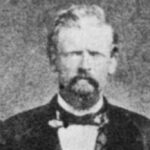 for him. Alternatively, Pinkham’s friends testified that he tried to avoid a showdown and that Patterson came to Warm Springs with the explicit purpose of murdering Pinkham. It took only an hour and a half for the jury to acquit Patterson. Pinkham’s funeral was the largest and most impressive funeral ever seen in the mining camp. It was reported that over 1,500 mourners followed his hearse to the graveyard. Meanwhile, knowing he was in extreme danger, Patterson quickly fled Idaho City after his acquittal. He was killed in Walla Walla, Washington, the next year, by Thomas Donahue, an area policeman, in was thought by many to be an assassination. Donahue was charged with the murder of Patterson, but escaped from jail while awaiting trial. There apparently was little interest in tracking him down. He disappeared never to be heard from again.
for him. Alternatively, Pinkham’s friends testified that he tried to avoid a showdown and that Patterson came to Warm Springs with the explicit purpose of murdering Pinkham. It took only an hour and a half for the jury to acquit Patterson. Pinkham’s funeral was the largest and most impressive funeral ever seen in the mining camp. It was reported that over 1,500 mourners followed his hearse to the graveyard. Meanwhile, knowing he was in extreme danger, Patterson quickly fled Idaho City after his acquittal. He was killed in Walla Walla, Washington, the next year, by Thomas Donahue, an area policeman, in was thought by many to be an assassination. Donahue was charged with the murder of Patterson, but escaped from jail while awaiting trial. There apparently was little interest in tracking him down. He disappeared never to be heard from again.
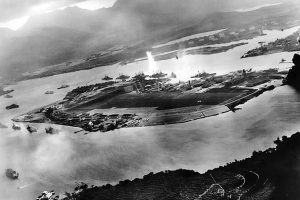
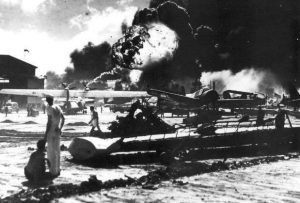 There are some national events that stay in our thoughts and hearts forever. The Pearl Harbor is one of those events. The attack on Pearl Harbor was so destructive and so unexpected that it shocked everyone…well, most everyone anyway. President Franklin D Roosevelt knew that Japan would likely attack, but thought it would be in the western Pacific Ocean, especially the Philippians. Pearl Harbor was considered an unlikely target. Roosevelt wanted to enter the war, but he wanted to attack Germany, whom he considered to be the bigger threat. In fact, he had ordered the attack on any U-Boats found in the west side of the Atlantic. So, technically the US was already in the war…most people just didn’t know that. Still, the attack on Pearl Harbor was horrific and the United States had to retaliate.
There are some national events that stay in our thoughts and hearts forever. The Pearl Harbor is one of those events. The attack on Pearl Harbor was so destructive and so unexpected that it shocked everyone…well, most everyone anyway. President Franklin D Roosevelt knew that Japan would likely attack, but thought it would be in the western Pacific Ocean, especially the Philippians. Pearl Harbor was considered an unlikely target. Roosevelt wanted to enter the war, but he wanted to attack Germany, whom he considered to be the bigger threat. In fact, he had ordered the attack on any U-Boats found in the west side of the Atlantic. So, technically the US was already in the war…most people just didn’t know that. Still, the attack on Pearl Harbor was horrific and the United States had to retaliate.
The attack on Pearl Harbor took so many people by surprise. It was a Sunday morning, and many of the military personnel were off base attending church services. The Japanese knew that the ships, planes, and the base in general would be seriously understaffed at the time of the attack. Of course, on the flip side, the fact that so many of the military personnel were away from the base at the time of the attack, meant that the base was able to get back up and running quickly and when we did enter the war, the Japanese were surprised about the attacks coming back at them. Of course, as we all know, the Allies went on to win the war against the Axis nation, including Germany and Japan. It’s been said that people shouldn’t wake the sleeping giant, and that is a wise statement. The Japanese awakened the United States to the fact that appeasing your enemies will not prevent an attack. It takes a show of military might to inform our enemies that it is wise to back away and let the sleeping giants lie.
Of course, the victory that was won following the attack of Pearl Harbor and the US entrance into World War II, came at a high price. A total of 2,403 people (both civilians and soldiers), not to mention ships, airplanes, and 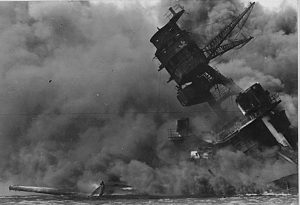
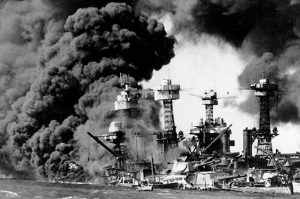 other military equipment. After the attack, the people of the United States were…angry!! We quickly geared up and the war was on for the United States. Our delay could never bring back the people we lost, but we would certainly avenge their loss. Today we remember those we lost, and those who went out to take up the fight to protect our country from such a horrendous attack.
other military equipment. After the attack, the people of the United States were…angry!! We quickly geared up and the war was on for the United States. Our delay could never bring back the people we lost, but we would certainly avenge their loss. Today we remember those we lost, and those who went out to take up the fight to protect our country from such a horrendous attack.
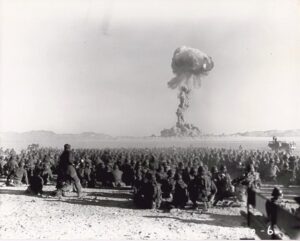
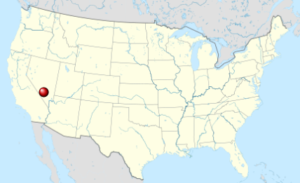 Our government has been known, in its history, to do some things that really were underhanded, and in some cases horrific. The “need” for nuclear bombs naturally facilitated the need for nuclear testing. I think everyone knows that would had to have happened, but on November 1, 1951, the US Army conducted nuclear tests in the Nevada desert that included a “diabolical exercise in which 6500 US Army troops were exposed to the effects of a nearby nuclear detonation and its associated radiation.” When I read that, I was furious. They knew what they were doing, and they did it as an experiment…just to see what would happen to those poor men.
Our government has been known, in its history, to do some things that really were underhanded, and in some cases horrific. The “need” for nuclear bombs naturally facilitated the need for nuclear testing. I think everyone knows that would had to have happened, but on November 1, 1951, the US Army conducted nuclear tests in the Nevada desert that included a “diabolical exercise in which 6500 US Army troops were exposed to the effects of a nearby nuclear detonation and its associated radiation.” When I read that, I was furious. They knew what they were doing, and they did it as an experiment…just to see what would happen to those poor men.
It was called Operation Buster–Jangle. The US Army conducted a series of 7 nuclear tests, that included the November 1st test. In that involuntary one test, the 6500 troops, were dug in foxholes and trenches only 6 miles from an air burst nuclear bomb of 21 kilotons yield. That is about the size of the Nagasaki bomb!! After the soldiers felt the hot nuclear wind blast over them, the wind deposited desert dust in choking clouds upon the men. Then, the soldiers were ordered to get up and march across the blast site to within 900 meters (a little over ½ a mile) of the nuclear “ground zero.” That is incredibly close, and those men were exposed.
The damage done to those men was not well documented, but the US Government later passed the 1990 Radiation Exposure Compensation Act (RECA) to compensate the military veterans exposed to nuclear testing in the 1950’s. The passing of that act is implied acknowledgment of the responsibility of the US government in long term health problems experienced by those troops…without actually placing the blame, and therefore opening the government up to future lawsuits. Basically, the men, were they still alive, or their families, if not, 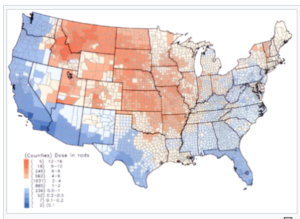
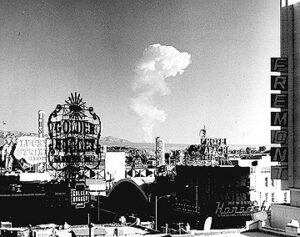 could theoretically be compensated for their losses. Of course, as many of us have seen with these kinds of cases, the process is very slow, the burden of proof for the men trying to receive compensation is heavy, and the final payout is usually quite low. RECA has awarded over $2.4 billion in benefits to more than 37,000 claimants since its inception in 1990. Still, that’s a small price to pay for the destruction of so many lives.
could theoretically be compensated for their losses. Of course, as many of us have seen with these kinds of cases, the process is very slow, the burden of proof for the men trying to receive compensation is heavy, and the final payout is usually quite low. RECA has awarded over $2.4 billion in benefits to more than 37,000 claimants since its inception in 1990. Still, that’s a small price to pay for the destruction of so many lives.
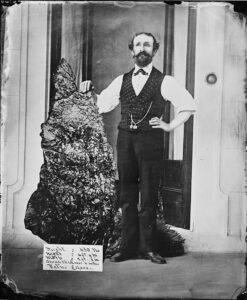 Bernhardt Otto Holtermann, who was born on April 29, 1838, was a prospector who owned part of an Australian claim where rich veins of gold were discovered after years of dry digging. I suppose it does take perseverance to successfully mine for gold, but when you consider that Holtermann finally discovered gold afteryears of digging, I would say that mining for gold also takes faith. Holtermann was born in Germany, and at adulthood set sail for Sydney, Australia in order to avoid military service. Most of his mining years were unsuccessful, including the year he even blew himself up with a premature explosion of blasting powder. Of course, his accidental explosion did not kill him, and must not have been very strong, because at the time of his greatest find, he still had all his limbs.
Bernhardt Otto Holtermann, who was born on April 29, 1838, was a prospector who owned part of an Australian claim where rich veins of gold were discovered after years of dry digging. I suppose it does take perseverance to successfully mine for gold, but when you consider that Holtermann finally discovered gold afteryears of digging, I would say that mining for gold also takes faith. Holtermann was born in Germany, and at adulthood set sail for Sydney, Australia in order to avoid military service. Most of his mining years were unsuccessful, including the year he even blew himself up with a premature explosion of blasting powder. Of course, his accidental explosion did not kill him, and must not have been very strong, because at the time of his greatest find, he still had all his limbs.
Holtermann’s “claim to fame” gold nugget was the largest gold specimen ever found, 59 inches long, weighing 630 pounds, and with an estimated gold content of 3,000 troy ounces. It was found at Hill End, near Bathurst, New South Wales. The nugget brought him enough wealth to build a mansion in North Sydney. Today, the mansion is one of the boarding houses at Sydney Church of England Grammar School (known as the Shore school). While working with one of his partners and later brother-in-law, Ludwig Hugo ‘Louis’ Beyers in their Star of Hope Gold Mining Company, in which he and Beyers were among the partners, they struck it rich. On February 22, 1868, Holtermann married Harriett Emmett, while Beyers married her sister Mary. On October 19, 1872, the Holtermann Nugget was discovered. While it was not “strictly speaking” a nugget, it was a gold specimen, a mass of gold embedded in rock, in this case quartz. Holtermann attempted to buy the 3,000-troy-ounce specimen from the company, offering £1000 over its estimated value of £12,000 (about AU$1.9 million in 2016 currency, AU$4.8 million on the 2017 gold price), 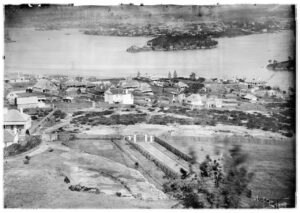 but was turned down, and the nugget was sent away to have the gold extracted. Holtermann was so upset about that, that resigned from the company in February 1873.
but was turned down, and the nugget was sent away to have the gold extracted. Holtermann was so upset about that, that resigned from the company in February 1873.
Holtermann did manage to get a photograph of himself with the nugget. This famous photo of Holtermann next to a giant “nugget” was taken by an unknown photographer. After leaving the Star of Hope Gold Mining Company, Holtermann was elected as a member for Saint Leonard’s parliament in 1882. Tragically, at the young age of just 47 years, Holtermann died in Sydney, Australia on his birthday, April 29, 1885, of “cancer of the stomach, cirrhosis of the liver, and dropsy.” He left behind his wife, three sons, and two daughters.
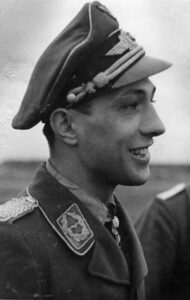 In every army, navy, and air force, there are exceptional soldiers…even among the enemy. During World War II, the German Luftwaffe had an incredible pilot. His name was Erich Rudorffer, and he is credited with shooting down thirteen Soviet aircraft in a single mission on October 11, 1943. In that historic mission while flying an FW-190, Rudorffer downed eight Yak-7s and five Yak-9s of the Soviet Air Force. He eventually shot down 222 enemy aircraft and ended up his combat career flying the Messerschmitt ME-262, the first operational jet fighter.
In every army, navy, and air force, there are exceptional soldiers…even among the enemy. During World War II, the German Luftwaffe had an incredible pilot. His name was Erich Rudorffer, and he is credited with shooting down thirteen Soviet aircraft in a single mission on October 11, 1943. In that historic mission while flying an FW-190, Rudorffer downed eight Yak-7s and five Yak-9s of the Soviet Air Force. He eventually shot down 222 enemy aircraft and ended up his combat career flying the Messerschmitt ME-262, the first operational jet fighter.
Still, it wasn’t just the number of planes he shot down that made him remarkable. It was also the fact that he managed to survive the war despite flying over 1000 missions and being shot down an incredible 16 times. He was even forced to parachute from his stricken fighter planes 9 of those times. Not just a Soviet killer, Rudorffer also shot down 86 aircraft operated by Western Allied air forces. He became a commercial pilot after World War II.
Rudorffer was born on November 1, 1917, in Zwochau, which was a part of the Kingdom of Saxony of the German Empire at that time. Strangely, or maybe not, very little is said or known about his parents. That was typical of the German leadership of that era. They felt like the state, and not the parents should raise the children, because…well, parents had no training in such things. Not that the German leadership did either, but they decided that they knew more than the parents, so they pulled the children from their parents’ homes and put them in boarding schools to “train” them in the German ways. After his graduation from school, Rudorffer received a vocational education as an automobile metalsmith specialized in coachbuilding, which was likely another of the German or “Nazi” way of deciding the course of the lives of the children. He might have stayed a mechanic were it not for World War I. “Rudorffer joined the military service of the Luftwaffe with Flieger-Ersatz-Abteilung 61 (Flier Replacement Unit 61) in Oschatz on April 16, 1936. From September 2 to October 15, 1936, he served with Kampfgeschwader 253 (KG 253—253rd Bomber Wing) and from October16, 1936 to February 24, 1937, he was trained as an aircraft engine mechanic at the Technische Schule Adlershof, the technical school at Adlershof in Berlin. On March 14, 1937, Rudorffer was posted to Kampfgeschwader 153 (KG 153—153rd Bomber Wing), where he served as a mechanic until end October 1938. After that, he was transferred to Flieger-Ersatz-Abteilung 51 (Flier Replacement Unit 51) based at Liegnitz in Silesia, present-day Legnica in Poland, for flight training. Rudorffer was first trained as a bomber pilot and then as a Zerstörer, a heavy fighter or destroyer, pilot. In the winter of 1944 Rudorffer was trained on the ME 262 jet fighter. In February 1945, he was recalled to command I. Gruppe JG 7 “Nowotny” from Major Theodor Weissenberger who replaced Steinhoff as Geschwaderkommodore. Rudorffer claimed 12 victories with the ME 262, to bring his total to 222. His tally  included 136 on the Eastern Front, 26 in North Africa, and 60 on the Western Front including 10 heavy bombers.”
included 136 on the Eastern Front, 26 in North Africa, and 60 on the Western Front including 10 heavy bombers.”
After the war ended, Rudorffer started out flying DC-2s and DC-3s in Australia. Later, he worked for Pan Am and the Luftfahrt-Bundesamt, Germany’s civil aviation authority. Rudorffer was honored as one of the characters in the 2007 Finnish war movie “Tali-Ihantala 1944.” A FW 190 participated, painted in the same markings as Rudorffer’s aircraft in 1944. The aircraft, now based at Omaka Aerodrome in New Zealand, still wears the colors of Rudorffer’s machine. Rudorffer died in April 2016 at the age of 98. At the time of his death, he was the last living recipient of the Knight’s Cross of the Iron Cross with Oak Leaves and Swords.
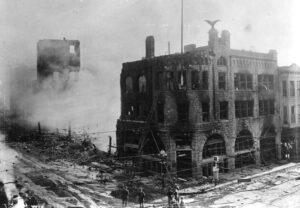 These days, terrorist attacks are…if not common, expected to happen at some point. It’s the crazy world we now live in, but in 1910, it wasn’t quite so common. Nevertheless, on October 1, 1910, there was a massive explosion that destroyed the Los Angeles Times building in the LA’s downtown area. The bombing killed 21 people and injuring many more. Harrison Otis, who was the Los Angeles Times publisher and a bitter opponent of unions, believed that the bomb was directed at him. So, he hired William J Burns, the nation’s top private detective to find out who the culprits were. Otis, in addition to printing numerous editorials against unions, was the leader of the Merchants and Manufacturing Association, which was a powerful group of business owners, all of whom had extensive political connections.
These days, terrorist attacks are…if not common, expected to happen at some point. It’s the crazy world we now live in, but in 1910, it wasn’t quite so common. Nevertheless, on October 1, 1910, there was a massive explosion that destroyed the Los Angeles Times building in the LA’s downtown area. The bombing killed 21 people and injuring many more. Harrison Otis, who was the Los Angeles Times publisher and a bitter opponent of unions, believed that the bomb was directed at him. So, he hired William J Burns, the nation’s top private detective to find out who the culprits were. Otis, in addition to printing numerous editorials against unions, was the leader of the Merchants and Manufacturing Association, which was a powerful group of business owners, all of whom had extensive political connections.
The investigation led Burns to the Bridge and Structural Iron Workers Union and their treasurer, John J McNamara. Burns personally arrested McNamara and his brother in Indiana in April 1911, after Burns got a confession out of Ortie McManigal. It seems that McManigal had allegedly been the intermediary between 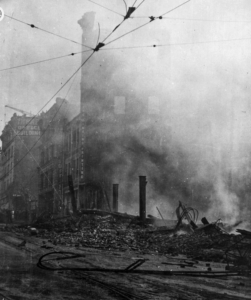 McNamara and two bomb experts. Burns had no legal authority to arrest anyone, but he did so, and managed to get the brothers to California, where they were scheduled to be prosecuted.
McNamara and two bomb experts. Burns had no legal authority to arrest anyone, but he did so, and managed to get the brothers to California, where they were scheduled to be prosecuted.
As is typical, and even expected, the Union members and left-wing supporters all rallied around the McNamara brothers. They raised a large defense fund, and union representatives pleaded with Clarence Darrow to take the case. Darrow was well known as the best defense attorney in America. He had already managed to get “Big Bill” Haywood, the union leader of the Industrial Workers of the World, off on murder charges in Idaho a few years earlier. After being offered $50,000, Darrow reluctantly took the case. Public opinion supported the McNamara brothers, but the investigation Darrow performed was quickly turning up evidence to prove that the brothers were actually guilty. To make matters worse, members of the defense team tried to bribe the jury, just to keep up with the prosecution’s own bribery tactics. In the end, Darrow worked out a deal with Otis and the prosecutors that the brothers would plead guilty to escape the death penalty, which they did. It was the best he could do for them.
Still, this plan was not acceptable to either side, and Darrow got caught in the middle. Darrow was soon 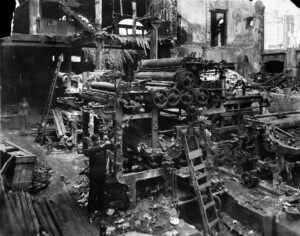 charged with bribery, and Otis arranged for Darrow’s prosecution. The union immediately deserted the great defense lawyer…not only did they refuse to pay his fee for the McNamara case, but they also refused to assist in his defense. Thankfully for Darrow, Earl Rogers, who was a notorious drunk, but also a brash, formidable, and effective Los Angeles attorney, took Darrow’s case. True to his reputation, Rogers managed to secure a mistrial for Darrow. Later, Darrow was acquitted after a second trial. Undaunted, Darrow went on to try even more distinguished cases, including the Leopold and Loeb murder trial and the Scopes evolution trial. Still, I doubt if any trial stood out in his memory quite as much as the trial that almost cost him his freedom.
charged with bribery, and Otis arranged for Darrow’s prosecution. The union immediately deserted the great defense lawyer…not only did they refuse to pay his fee for the McNamara case, but they also refused to assist in his defense. Thankfully for Darrow, Earl Rogers, who was a notorious drunk, but also a brash, formidable, and effective Los Angeles attorney, took Darrow’s case. True to his reputation, Rogers managed to secure a mistrial for Darrow. Later, Darrow was acquitted after a second trial. Undaunted, Darrow went on to try even more distinguished cases, including the Leopold and Loeb murder trial and the Scopes evolution trial. Still, I doubt if any trial stood out in his memory quite as much as the trial that almost cost him his freedom.
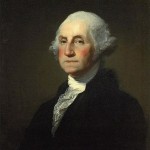 George Washington was not just our first president, but he was also an incredibly intelligent man. Normally, when George Washington spoke, people listened. Maybe his leadership was a big part of what made our system of government work so well, but there was one thing that everyone decided to ignore…his warnings about political parties. George Washington was against them, you see. He wasn’t just against one side of the political party system. He was against having political parties at all. He was so adamantly against them, that he remained nonpartisan throughout his entire presidency.
George Washington was not just our first president, but he was also an incredibly intelligent man. Normally, when George Washington spoke, people listened. Maybe his leadership was a big part of what made our system of government work so well, but there was one thing that everyone decided to ignore…his warnings about political parties. George Washington was against them, you see. He wasn’t just against one side of the political party system. He was against having political parties at all. He was so adamantly against them, that he remained nonpartisan throughout his entire presidency.
In his farewell address, President Washington said the following about partisan politics, “It serves always to distract the public councils and enfeeble the public administration. It agitates the community with ill-founded jealousies and false alarms, kindles the animosity of one part against another, foments occasionally riot and insurrection. It opens  the door to foreign influence and corruption, which finds a facilitated access to the government itself through the channels of party passions. Thus, the policy and the will of one country are subjected to the policy and will of another.” Any of this sound familiar? Of course, it does. It is exactly what we have going on today.
the door to foreign influence and corruption, which finds a facilitated access to the government itself through the channels of party passions. Thus, the policy and the will of one country are subjected to the policy and will of another.” Any of this sound familiar? Of course, it does. It is exactly what we have going on today.
I agree with President Washington, who worried that political parties would become too powerful, rob the people of their control over their own government, and distract everyone from what they should really be focusing on. In today’s political arena, that is exactly what is going on. People are being indited as a way of weaponizing politics. If someone doesn’t agree with the other party, or can’t be controlled, they are very likely to be politically ostracized and attacked. Since George Washington spoke those words, 250 years have passed, and there are people saying that they don’t trust either political party. I am one of those. I suppose some 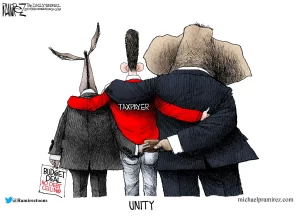 people would wonder how we would elect our leaders. To them, I say, “How about electing them on their merits!!” There are people out there who will simply vote for the party they are affiliated with, no matter what their candidate stands for. They vote the way they vote, simply because the candidate they choose is from their party. What a horrible mistake that is. Isn’t it time that we find out what our candidates really stand for, and then vote our conscience? Isn’t it time we hold our politicians accountable for their actions? I think it is, but then we would have to find a way to get the correct information, and we already know that we can’t trust the media!! But that is another story.
people would wonder how we would elect our leaders. To them, I say, “How about electing them on their merits!!” There are people out there who will simply vote for the party they are affiliated with, no matter what their candidate stands for. They vote the way they vote, simply because the candidate they choose is from their party. What a horrible mistake that is. Isn’t it time that we find out what our candidates really stand for, and then vote our conscience? Isn’t it time we hold our politicians accountable for their actions? I think it is, but then we would have to find a way to get the correct information, and we already know that we can’t trust the media!! But that is another story.
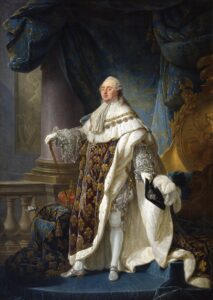 Normally, in a monarchy, the successor is determined by bloodline. In a Republic, the successor is determined by an election. There are a number of people who seriously dislike monarchies, and then there are those who prefer it…they think it gives their nation stability and continuity. Be that as it may, when enough people decide to end a monarchy, they can get the job done. Such was the case in Revolutionary France, when the Legislative Assembly voted to abolish the monarchy and establish the First Republic.
Normally, in a monarchy, the successor is determined by bloodline. In a Republic, the successor is determined by an election. There are a number of people who seriously dislike monarchies, and then there are those who prefer it…they think it gives their nation stability and continuity. Be that as it may, when enough people decide to end a monarchy, they can get the job done. Such was the case in Revolutionary France, when the Legislative Assembly voted to abolish the monarchy and establish the First Republic.
Things had been going downhill for King Louis XVI and a year before the Legislative Assembly voted, he has no other choice but to approve a new constitution that stripped him of much of his power. This was the beginning of the end for King Louis XVI. Louis ascended to the French throne in 1774 as all monarchs do, by inheritance. From the  start, he was unsuited to deal with the severe financial problems that he inherited from his predecessors, along with the throne. Unfortunately, not all those who would inherit the throne of a nation are suited for that leadership.
start, he was unsuited to deal with the severe financial problems that he inherited from his predecessors, along with the throne. Unfortunately, not all those who would inherit the throne of a nation are suited for that leadership.
The situation continued to escalate, and in 1789, food shortages and economic crises led to the outbreak of the French Revolution. By August of 1792, things escalated to a boil. At that point, King Louis and his queen, Mary-Antoinette, were imprisoned and in September the monarchy was abolished. Soon after their imprisonment, 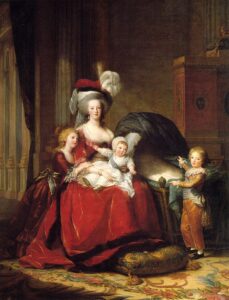 evidence of Louis’ counterrevolutionary activity with foreign nations was discovered. He was put on trial for treason. I don’t know the details of the case for treason, but of course, he could not have been put on trial before the changes that were forced upon him in the changing of the constitution. It is also possible that there were no legitimate charges to used, until they forced the changing of the constitution. I’m sure there are opinions on both sides of the issue.
evidence of Louis’ counterrevolutionary activity with foreign nations was discovered. He was put on trial for treason. I don’t know the details of the case for treason, but of course, he could not have been put on trial before the changes that were forced upon him in the changing of the constitution. It is also possible that there were no legitimate charges to used, until they forced the changing of the constitution. I’m sure there are opinions on both sides of the issue.
Louis was convicted and condemned to death by a narrow majority in January of 1793, and on January 21, 1793, he walked steadfastly to the guillotine and was executed. His head was held high, and he proclaimed his innocence to the very end. Nine months later, his queen, Marie-Antoinette followed him to the guillotine. Neither of them ever confessed to the crimes for which they were committed, and I don’t suppose we will ever know the truth about the matter.
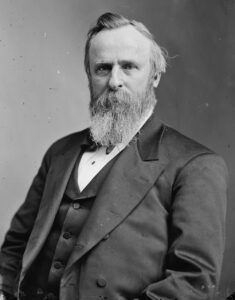 When we think of a president of the United States, we think of one each term. In reality, on inauguration years, there are actually two…the outgoing president, and the incoming president. Of course, if the president has won a second term, there would actually be only one in that inauguration cycle. That is the common fact of presidential inaugurations, but could there be three? The answer is actually, yes. There have been two times in history when there were three presidents in one year. I suppose that potentially there could be more than this, but the reasons would almost be too awful to contemplate.
When we think of a president of the United States, we think of one each term. In reality, on inauguration years, there are actually two…the outgoing president, and the incoming president. Of course, if the president has won a second term, there would actually be only one in that inauguration cycle. That is the common fact of presidential inaugurations, but could there be three? The answer is actually, yes. There have been two times in history when there were three presidents in one year. I suppose that potentially there could be more than this, but the reasons would almost be too awful to contemplate.
On September 20, 1881, Chester Arthur became one of those two “third” presidents, when he was inaugurated that day, becoming the third person to serve as president in that year. The year 1881 began with Republican Rutherford B Hayes in office. Hayes 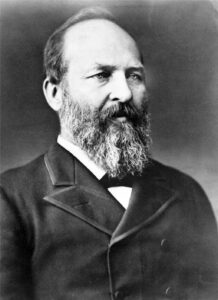 had just completed his first and only term as president, and with the inauguration of James A Garfield, Hayes had officially turned over the reins of government to the new president, who happened to be a close friend of his, in March 1881. Then, the unthinkable happened, when just four months into his term, on July 2, Garfield was shot by an assassin named Charles Guiteau. Guiteau said that he killed Garfield because he refused to grant Guiteau a political appointment. The attack left Garfield with wounds to his back and abdomen. He struggled to recover throughout the summer. Though it appeared he would pull through in early September, Garfield deteriorated by mid-September and finally died on September 19th. An autopsy report revealed that the internal bullet wound contributed to an aneurism that ultimately killed Garfield.
had just completed his first and only term as president, and with the inauguration of James A Garfield, Hayes had officially turned over the reins of government to the new president, who happened to be a close friend of his, in March 1881. Then, the unthinkable happened, when just four months into his term, on July 2, Garfield was shot by an assassin named Charles Guiteau. Guiteau said that he killed Garfield because he refused to grant Guiteau a political appointment. The attack left Garfield with wounds to his back and abdomen. He struggled to recover throughout the summer. Though it appeared he would pull through in early September, Garfield deteriorated by mid-September and finally died on September 19th. An autopsy report revealed that the internal bullet wound contributed to an aneurism that ultimately killed Garfield.
On September 20, 1881…the next day, Vice President Chester Arthur was sworn in as 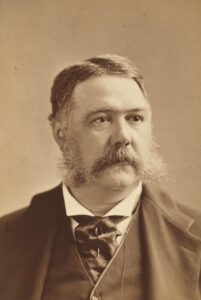 president, making him the third man to be sworn in as president in 1881. Garfield’s assassin then actually had the nerve to write to the new president from jail, and actually taking credit for vaulting Arthur into the White House. While President Arthur was president, not everyone felt like he was a good president. Former President Hayes, said of the Arthur administration, that it was best known for “liquor, snobbery and worse.” Of course, Hayes could have been angry about not being elected to a second term, or he could have been making an honest evaluation. that may be a good subject for a future story. Either way, Chester Arthur served only one term from 1881 to 1885.
president, making him the third man to be sworn in as president in 1881. Garfield’s assassin then actually had the nerve to write to the new president from jail, and actually taking credit for vaulting Arthur into the White House. While President Arthur was president, not everyone felt like he was a good president. Former President Hayes, said of the Arthur administration, that it was best known for “liquor, snobbery and worse.” Of course, Hayes could have been angry about not being elected to a second term, or he could have been making an honest evaluation. that may be a good subject for a future story. Either way, Chester Arthur served only one term from 1881 to 1885.
While this was a very unusual year, it was not the first time this had happened. It was actually the second time in American history that three men served as president in one year. A similar situation occurred in 1841, when Martin Van Buren, William Henry Harrison, and John Tyler all held the office, but that is a different story for another day.

